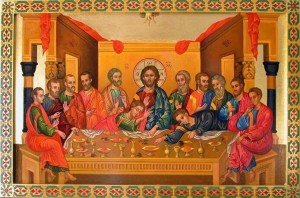Although the Eastern Fathers were aware that in the West the procession of the Holy Spirit from the Father and the Son was taught, they did not usually regard it as heretical: “a whole series of Western writers, including popes who are venerated as saints by the Eastern church, confess the procession of the Holy Spirit also from the Son; and it is even more striking that there is virtually no disagreement with this theory.
The phrase Filioque first appears as an anti-Arian interpolation in the Creed at the Third Council of Toledo (589) at which time Spain renounced Arianism, accepting the true faith. The addition of this phrase was then confirmed by other local councils in Toledo and soon spread throughout the West, not only in Spain, but also in the kingdom of the Franks, who had adopted the Western Christian faith in 496, and in England, where the Council of Hatfield imposed it in 680 as a response to the heresy of Monothelitism. It should be noted, however, it was not adopted in Rome.
A number of Church Fathers of the 4th and 5th centuries explicitly speak of the Holy Spirit as proceeding “from the Father and the Son”. They include Ephrem the Syrian, Epiphanius of Salamis and Cyril of Alexandria. In the 7th century, Maximus the Confessor declared it wrong to make accusations against the Romans for saying that the Holy Spirit proceeds also from the Son, since the Romans were able to cite the unanimous support of the Latin Fathers and a statement by Saint Cyril of Alexandria.
The Eastern Church Fathers, as I have expressed in previous articles, use the phrase “from the Father through the Son”. The Roman Catholic Church accepts both phrases and considers that they do not affect the reality of the same faith and instead express the same truth in slightly different ways. The influence of Augustine made the phrase “proceeds from the Father through the Son” popular throughout the West but, while used also in the East, “through the Son” was later dropped or rejected by some as being nearly equivalent to “from the Son” or “and the Son”. Others argue that in the text of the Nicaeno-Constantinopolitan Creed, it says that the Holy Spirit proceeds “from the Father” but did “not state that the Spirit proceeds from the Father alone”. Religion can be a tricky business where words and phrases mean a lot.

